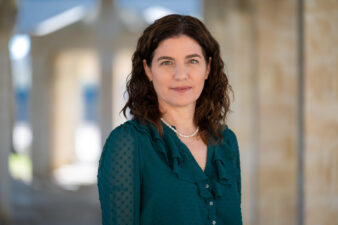 While in the center of the country, the concern is to improve food quality, public transportation and vehicle efficiency, in the periphery Israel’s decision-makers worry about building a satisfying enough environment to attract and keep young people who otherwise flee to Tel Aviv. This reality was clear at a conference this morning on industry in the Negev, organized by Ben Gurion University and attended by newly appointed Minister of Development in the Negev and Galilee, Silvan Shalom.
While in the center of the country, the concern is to improve food quality, public transportation and vehicle efficiency, in the periphery Israel’s decision-makers worry about building a satisfying enough environment to attract and keep young people who otherwise flee to Tel Aviv. This reality was clear at a conference this morning on industry in the Negev, organized by Ben Gurion University and attended by newly appointed Minister of Development in the Negev and Galilee, Silvan Shalom.
The opening remarks were telling. Beer Sheva’s newly elected mayor Rubik Danilovitch (photo) was the first speaker. He announced that long-delayed plans to erect a high-tech park in the city were finally moving along, which would hopefully provide quality employment. He also thanked the chemical industry, whose representatives were at the conference, for their recent steps to improve their environmental record.
Shraga Brosh, president of the Manufacturers’ Association of Israel, then spoke about the dearth of skilled labor in the south, which makes companies leery of putting up factories in the Negev. He spoke about the need to improve education and transportation to make it easier to live or work in the south.
Coming from another angle, Shmulik Ripman, head of the Ramat Hanegev Regional Council, said that the fight for transportation to Beer Sheva and the south has largely been won, but that there was a need to keep building industrial centers around the Negev. Further, he added that ease of commuting meant that each town in the desert doesn’t need its own factories, but rather that they can be concentrated in a few areas.
I found the balance between the three intriguing because it shows that in the Negev, the debate is still very much about how to grow the local pie and not how to make that pie organic (sorry for the awful pun). As Ripman touted commuting and regional industrial parks, I wondered about the resulting car dependency and the toll it would take on the urban fabric of towns that turn into dormitory communities without an industrial tax base. Likewise, I took Danilovich’s goodwill toward the chemical industry with another grain of salt.
Notably, there were no comprehensive environmentally correct plans put forward. I left the conference feeling that without a more vocal green vision for the Negev, it is unsurprising and also understandable that local leaders will continue to hope for the sort of development that has long been the status quo despite its ecological costs.
(Photo from http://one.beersheva.biz)




These days,the major concern in this changing world is to improve food quality, public transportation and vehicle efficiency, in the periphery world leaders who are the decision-makers worry about building a satisfying enough environment to attract and keep young people who otherwise flee to different cities.
Daniella Shalom,
Your touching on one of the most contentious issues surrounding the seemingly endless debate about “developing the Negev” – namely – why are we developing the Negev in the first place and who do we want the development to benefit?
In my experience running Earth’s Promise, a Be’er Sheva based, grassroots NGO (www.earthspromise.org) the answer has all too often been – to make it attractive for people from the “Mercaz” (the central part of the country) to move down. Unfortunately, that answer completely fails to address the needs of the regions current residents and is one of the main reasons why the “development” continues to stagnate.
As Earth’s Promise has been able to show with our “Setting Strong Roots” community garden initiative (http://tiny.cc/msGjt), by addressing the residents actual needs as opposed to planning for the perceived needs of an abstract population, the results are far more successful.
I hope that your article can help get this conversation out in to the mainstream so that once and for all we can think up a truly creative and comprehensive solution for the development of the Negev that takes in to account both local as well as national needs.
All the Best,
Isaac Hametz
Founder and Executive Director
Earth’s Promise